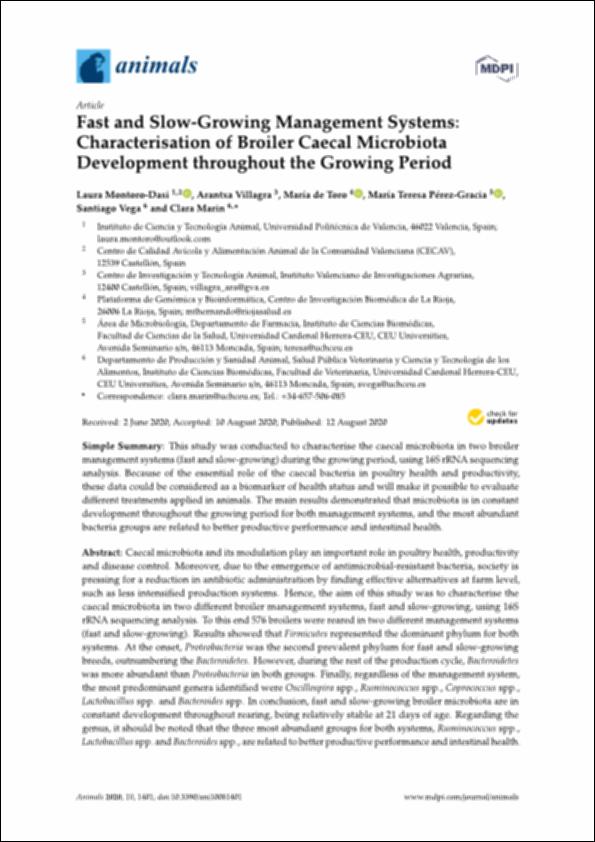Por favor, use este identificador para citar o enlazar este ítem:
http://hdl.handle.net/10637/12500Fast and slow-growing management systems : characterisation of broiler caecal microbiota development throughout the growing period
| Título : | Fast and slow-growing management systems : characterisation of broiler caecal microbiota development throughout the growing period |
| Autor : | Montoro Dasí, Laura Villagrá García, Aránzazu Toro Hernando, María de Pérez Gracia, María Teresa. Vega García, Santiago Marín Orenga, Clara |
| Materias: | Animal genetics.; Aves de corral - Crecimiento.; Poultry - Growth.; Biochemical markers.; Poultry - Genetics.; Marcadores bioquímicos.; Bacteriophages.; Aves de corral - Bacteriología.; Poultry - Bacteriology.; Genética animal.; Aves de corral - Genética.; Bacteriófagos. |
| Editorial : | MDPI |
| Citación : | Montoro-Dasi, L., Villagra, A., de Toro, M., Pérez-Gracia, M.T., Vega, S. & Marin, C. Fast and slow-growing management systems: characterisation of broiler caecal microbiota development throughout the growing period. Animals, vol. 10, i. 8 (12 aug.), art. 1401. DOI: https://doi.org/10.3390/ani10081401 |
| Resumen : | Caecal microbiota and its modulation play an important role in poultry health, productivity and disease control. Moreover, due to the emergence of antimicrobial-resistant bacteria, society is pressing for a reduction in antibiotic administration by finding e ective alternatives at farm level, such as less intensified production systems. Hence, the aim of this study was to characterise the caecal microbiota in two di erent broiler management systems, fast and slow-growing, using 16S rRNA sequencing analysis. To this end 576 broilers were reared in two di erent management systems (fast and slow-growing). Results showed that Firmicutes represented the dominant phylum for both systems. At the onset, Proteobacteria was the second prevalent phylum for fast and slow-growing breeds, outnumbering the Bacteroidetes. However, during the rest of the production cycle, Bacteroidetes was more abundant than Proteobacteria in both groups. Finally, regardless of the management system, the most predominant genera identified were Oscillospira spp., Ruminococcus spp., Coprococcus spp., Lactobacillus spp. and Bacteroides spp. In conclusion, fast and slow-growing broiler microbiota are in constant development throughout rearing, being relatively stable at 21 days of age. Regarding the genus, it should be noted that the three most abundant groups for both systems, Ruminococcus spp., Lactobacillus spp. and Bacteroides spp., are related to better productive performance and intestinal health. |
| Descripción : | Este artículo se encuentra disponible en la siguiente URL: https://www.mdpi.com/2076-2615/10/8/1401 Este artículo pertenece a la sección "Poultry". |
| URI : | http://hdl.handle.net/10637/12500 |
| Derechos: | http://creativecommons.org/licenses/by/4.0/deed.es |
| ISSN : | 2076-2615 (Electrónico). |
| Fecha de publicación : | 12-ago-2020 |
| Centro : | Universidad Cardenal Herrera-CEU |
| Aparece en las colecciones: | Dpto. Producción y Sanidad Animal, Salud Pública Veterinaria y Ciencia y Tecnología de los Alimentos |
Los ítems de DSpace están protegidos por copyright, con todos los derechos reservados, a menos que se indique lo contrario.


